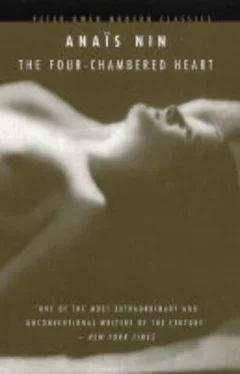Anaïs Nin - The Four-Chambered Heart
Здесь есть возможность читать онлайн «Anaïs Nin - The Four-Chambered Heart» весь текст электронной книги совершенно бесплатно (целиком полную версию без сокращений). В некоторых случаях можно слушать аудио, скачать через торрент в формате fb2 и присутствует краткое содержание. Год выпуска: 2004, ISBN: 2004, Издательство: Peter Owen Limited, Жанр: Классическая проза, Эротические любовные романы, на английском языке. Описание произведения, (предисловие) а так же отзывы посетителей доступны на портале библиотеки ЛибКат.
- Название:The Four-Chambered Heart
- Автор:
- Издательство:Peter Owen Limited
- Жанр:
- Год:2004
- ISBN:9780720611557
- Рейтинг книги:3 / 5. Голосов: 1
-
Избранное:Добавить в избранное
- Отзывы:
-
Ваша оценка:
- 60
- 1
- 2
- 3
- 4
- 5
The Four-Chambered Heart: краткое содержание, описание и аннотация
Предлагаем к чтению аннотацию, описание, краткое содержание или предисловие (зависит от того, что написал сам автор книги «The Four-Chambered Heart»). Если вы не нашли необходимую информацию о книге — напишите в комментариях, мы постараемся отыскать её.
The Four-Chambered Heart — читать онлайн бесплатно полную книгу (весь текст) целиком
Ниже представлен текст книги, разбитый по страницам. Система сохранения места последней прочитанной страницы, позволяет с удобством читать онлайн бесплатно книгу «The Four-Chambered Heart», без необходимости каждый раз заново искать на чём Вы остановились. Поставьте закладку, и сможете в любой момент перейти на страницу, на которой закончили чтение.
Интервал:
Закладка:
Her own lightness, her freedom of movement, her habit of sudden vanishings made her escapes more possible, whereas Rango, on the contrary, had never been known to leave except when the bottles, the people, the night, the cafe, the streets were utterly empty.
But for her, his inability to overcome the obstacles which delayed him lessened the power of his love.
Little by little, she became aware that he had two fires to light, one at home for Zora, and one on the barge. When he arrived late and wet, she was moved by his tiredness and her awareness of his burdens at home, and she began to light the fire for him.
He loved to sleep late, while she would be awakened by the passing of coal barges, by foghorns, and by the heavy traffic over the bridge. So she would dress quietly and she would run to the cafe at the corner and return with coffee and buns to surprise him on awakening.
“How human you are, Djuna, how warm and human…”
“But what did you expect me to be?”
“Oh, you look as if the very day you were born you took one look at the world and decided to live in some region between heaven and earth which the Chinese called the Wise Place.”
The immense clock on the Quai d’Orsay station which sent people traveling, showed such an enormous, reproachful face in the morning: it is time to take care of Zora, it is time to take care of your father, it is time to return to the world, time time time…
As she knew how much she had loved to see the red lantern gleaming behind the window of the barge as she walked toward it, when Rango fell back into his habit of lateness, it was she who lit the lantern for him, mastering her fear of the dark barge, the drunken watchman, the hobos asleep, the moving figures behind the trees.
When she discovered how strong was his need of wine, she never said: don’t drink. She bought a small barrel at the flea market, had it filled with red wine, and placed it at the head of the bed within reach of his hand, having faith that their life together, their adventures together, and the stories they told each other to pass the time, would soon take the place of the wine. Having faith that their warmth together would take the place of the warmth of the wine, believing that all the natural intoxications of caresses would flow from her and not the barrel…
Then one day he arrived with a pair of scissors in his pocket. Zora was in the hospital for a few days. It was she who always cut his hair. He hated barbers. Would Djuna like to cut his hair?
His heavy, his brilliant, his curling black hair, which neither water nor oil could tame. She cut it as he wished, and felt, for a moment, like his true wife.
Then Zora returned home, and resumed her care of Rango’s hair.
And Djuna wept for the first time, and Rango did not understand why she wept.
“I would like to be the one to cut your hair.”
Rango made a gesture of impatience. “I don’t see why you should give that any importace. It doesn’t mean anything. I don’t understand you at all.”
If it were not for music, one could forget one’s life and be born anew, washed of memories. If it were not for music one could walk through the markets of Guatemala, through the snows of Tibet, up the steps of Hindu temples, one could change costumes, shed possessions, retain nothing of the past.
But music pursues one with some familiar air and no longer does the heart beat in an anonymous forest of heartbeats, no longer is it a temple, a market, a street like a stage set, but now it is the scene of a human crisis reenacted inexorably in all its details, as if the music had been the score of the drama itself and not its accompaniment.
The last scene between Rango and Djuna might have faded into sleep, and she might have forgotten his refusal to let her cut his hair once more, but now the organ grinder on the quay turned his handle mischievously, and aroused in her the evocation of another scene. She would not have been as disturbed by Rango’s evasiveness, or his defense of Zora’s rights to the cutting of his hair, if it had not added itself to other scenes which the organ grinder had attended with similar tunes, and which he was now recreating for her, other scenes where she had not obtained her desire, had not been answered.
The organ grinder playing Carmen took her back inexorably like an evil magician to the day of her childhood when she had asked for an Easter egg as large as herself, and her father had said impatiently: “What a silly wish!” Or to another time when she had asked him to let her kiss his eyelids, and he had mocked her, or still another time when she had wept at his leaving on a trip and he had said: “I don’t understand your giving this such importance.”
Now Rango was saying the same thing: “I don’t understand why you should be sad at not being able to cut my hair any longer.”
Why could he not have opened his big arms to her, sheltered her for an instant and said: “It cannot be, that right belongs to Zora, but I do understand how you feel, I do understand you are frustrated in your wish to care for me as a wife…”
She wanted to say: “Oh, Rango, beware. Love never dies of a natural death. It dies because we don’t know how to replenish its source, it dies of blindness and errors and betrayals. It dies of illnesses and wounds, it dies of weariness, of witherings, of tarnishings, but never of natural death. Every lover could be brought to trial as the murderer of his own love. When something hurts you, saddens you, I rush to avoid it, to alter it, to feel as you do, but you turn away with a gesture of impatience and say: ‘I don’t understand.’”
It was never one scene which took place between human beings, but many scenes converging like great intersections of rivers. Rango believed this scene contained nothing but a whim of Djuna’s to be denied.
He failed to see that it contained at once all of Djuna’s wishes which had been denied, and these wishes had flown from all directions to meet at this intersection and to plead once more for understanding.
All the time that the organ grinder was unwinding the songs Carmen in the orchestra pit of this scene, what was conjured was not this room in a barge, and these two people, but a series of rooms and a procession of people, accumulating to reach immense proportions, accumulating analogies and repetitions of small defeats until it contained them all, and the continuity of the organ grinder’s accompaniment welded, compressed them all into a large injustice. Music expanding the compressed heart created a tidal wave of injustice for which no Noah’s Ark had ever been provided.
The fire sparkled high; their eyes reflected all its dances joyously.
Djuna looked at Rango with a premonition of difficulties, for it so often happened that their gaiety wakened in him a sudden impulse to destroy their pleasure together. Their joys together never a luminous island in the present but stimulating his remembrance that she had been alive before, that her knowledge of caresses had been taught to her by others, that on other nights, in other rooms, she had smiled. At every peak of contentment she would tremble slightly and wonder when they would begin to slide into torment.
This evening the danger came unsuspected as they talked of painters they liked, and Rango said suddenly: “And to think that you believed Jay a great painter!”
When she defended a friend from Rango’s irony and wit it always aroused his jealousy, but to defend an opinion of a painter, Djuna thought, could be achieved without danger.
“Of course, you’ll defend Jay,” said Rango, “he was a part of your former life, of your former values. I will never be able to alter that. I want you to think as I do.”
“But Rango, you couldn’t respect someone who surrendered an opinion merely to please you. It would be hypocrisy.”
Читать дальшеИнтервал:
Закладка:
Похожие книги на «The Four-Chambered Heart»
Представляем Вашему вниманию похожие книги на «The Four-Chambered Heart» списком для выбора. Мы отобрали схожую по названию и смыслу литературу в надежде предоставить читателям больше вариантов отыскать новые, интересные, ещё непрочитанные произведения.
Обсуждение, отзывы о книге «The Four-Chambered Heart» и просто собственные мнения читателей. Оставьте ваши комментарии, напишите, что Вы думаете о произведении, его смысле или главных героях. Укажите что конкретно понравилось, а что нет, и почему Вы так считаете.












